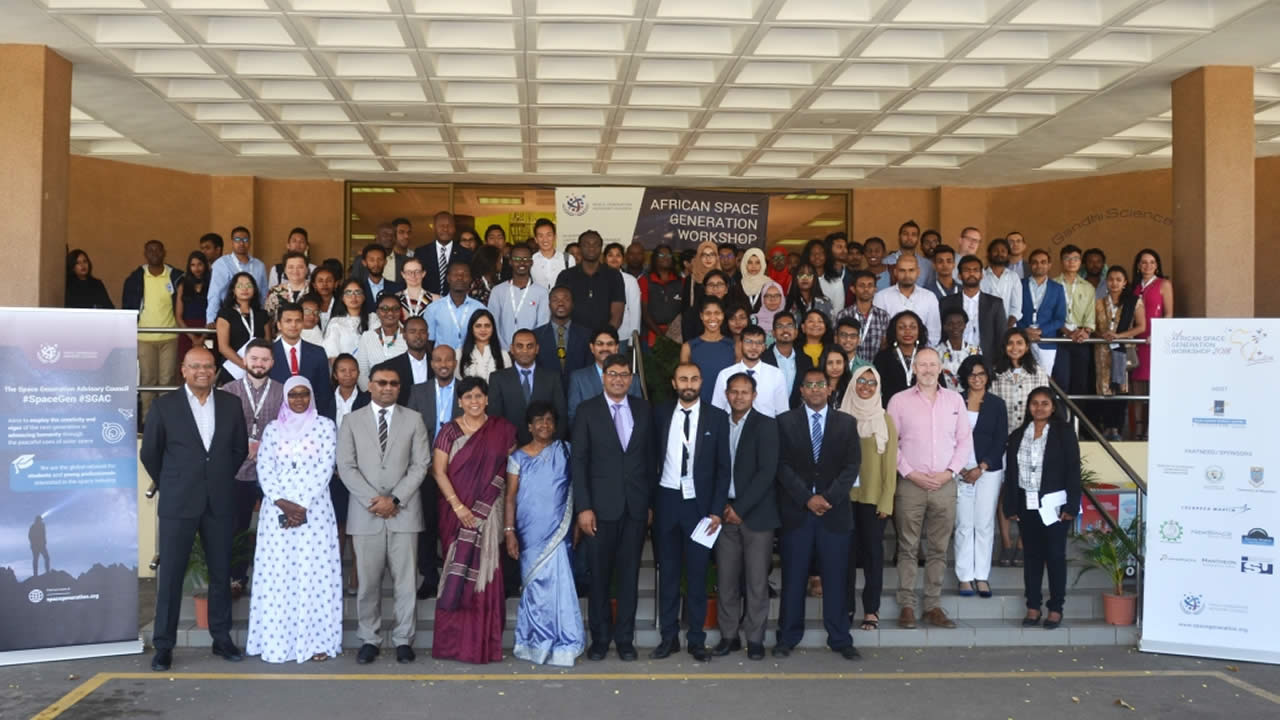
Mauritius hosted the 2nd African Space Generation Workshop (AF-SGW), an international space workshop for students and young professionals on the 17th and 18th December at the Rajiv Gandhi Science Centre at Bell Village. Organised by the Space Generation Advisory Council (SGAC) under aegis of the United Nations, the workshop welcomed over 80 delegates from in and outside Africa.
‘Launching Africa: Space Exploration, Innovation and Business’ was the theme of the two-day international workshop, which gathered delegates, among whom were students, young professionals, scientists, industry leaders and space agencies, from in and outside Africa. The 2nd African Space Generation Workshop (AF-SGW) was, in fact, one of the largest gatherings of African youth interested in space.
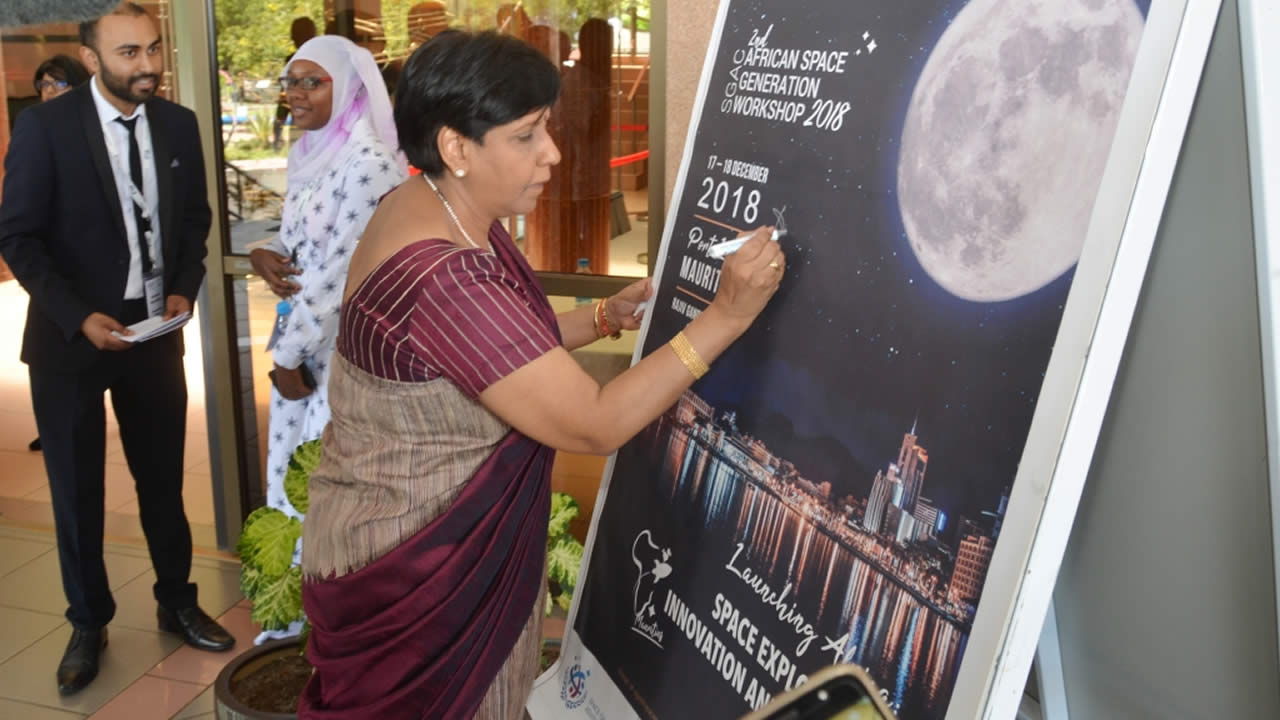
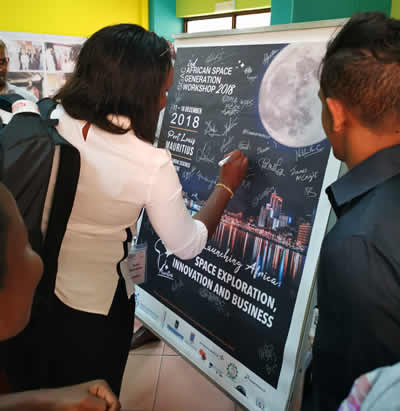 It was launched on Monday in the presence of the Minister of Education and Human Resources Leela Devi Dookun-Luchoomun and the Minister of Technology, Communication and Innovation Yogida Sawmynaden. In her address, the Minister of Education highlighted that people need to get rid of the prevailing misconception about developed countries being the only ones to access space technology, rockets and satellite.
It was launched on Monday in the presence of the Minister of Education and Human Resources Leela Devi Dookun-Luchoomun and the Minister of Technology, Communication and Innovation Yogida Sawmynaden. In her address, the Minister of Education highlighted that people need to get rid of the prevailing misconception about developed countries being the only ones to access space technology, rockets and satellite.
Yogida Sawmynaden, for his part, underscored that Mauritius is investing in space and astronomy so as to leap forward technologically and create a better future for its citizens and is extending its support in one of the biggest scientific endeavours, namely the Square Kilometre Array (SKA). Mauritius was actually chosen to host the prestigious event, given its increasing role in space and astronomy with projects such as the Square Kilometre Array and the Mauritius Radio Telescope.
Jointly hosted by Space Generation Advisory Council (SGAC) and the Rajiv Gandhi Science Centre, this first ever Space Generation Workshop held in Mauritius focused on regional space and scientific issues that are targeted to support future regional and global space policy initiatives and encourage international collaborations on the continent. It also aimed to encourage young professionals to participate in the commercial and private space activities on a global scale.
Hansley Noruthun, African Space Generation Workshop Manager and the event manager of the workshop, stated that they believed it was time to bring such a platform and programme to Mauritius, as the country has been working on numerous projects and initiatives in relation to space and science for years and has given increasing interest and development in the sector.
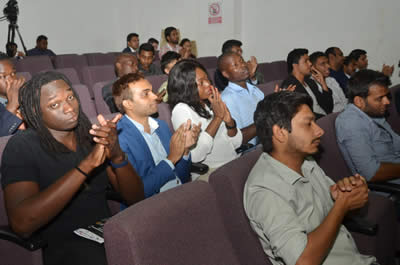 For its second edition, Hansley explained this regional workshop in Africa truly represents the voice of the next generation leaders on the global scale. “It’s purpose is to create a network where we can connect to peers and professionals from various sectors through events, project groups and representations within United Nations,” he said. He underlined that the SGAC has a Permanent Observer status at the United Nations Committee on the Peaceful Uses of Outer Space and that based on the talks and recommendations from the working groups throughout the two-day workshop, they will submit a report which will be then submitted to the UN COPUOS.
For its second edition, Hansley explained this regional workshop in Africa truly represents the voice of the next generation leaders on the global scale. “It’s purpose is to create a network where we can connect to peers and professionals from various sectors through events, project groups and representations within United Nations,” he said. He underlined that the SGAC has a Permanent Observer status at the United Nations Committee on the Peaceful Uses of Outer Space and that based on the talks and recommendations from the working groups throughout the two-day workshop, they will submit a report which will be then submitted to the UN COPUOS.
During the event, young professionals and the industry representatives examined, considered and stimulated interdisciplinary perspectives on space and scientific matters in the African region. Selected participants from the African region had the opportunity to interact with experts from academia, business and space agencies through plenary and panel sessions, keynotes and interdisciplinary working group discussions. The rich exchanges focused on critical space sector opportunities and challenges, global policy initiatives and international cooperation.
About the Space Generation Advisory Council (SGAC)
Space Generation Advisory Council (SGAC) is a non-profit organisation and professional network that represents university students and young professionals in the space sector. The organisation is a member of both the UN Economic and Social Council and International Astronautical Federation (IAF). Headquartered in Vienna, Austria, SGAC is supported by volunteer network of over 10,000 members in more than 100 countries. One of the main missions of SGAC is to connect the next generation of leaders of the aerospace industry internationally.
Participants
Felaniaina Lantovololona: “Collaboration is needed in the space science field”
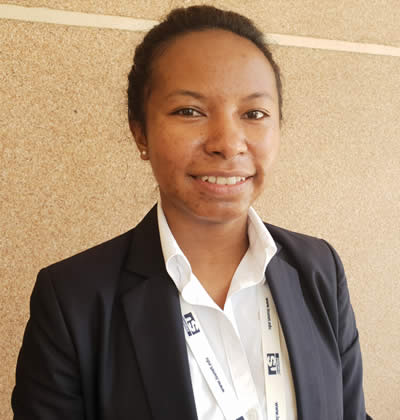 Despite working in the Ministry of Fisheries in Madagascar and having a background in marine life science and agronomy, Felaniaina explained that she is very much interested in learning about space science. “First off, it is an African conference and I am an African. Secondly, space science is an out breaking one, so I am keen to learn about it. I am pretty curious about everything and I am a scientist. By attending this conference, I wanted to meet up with the many participating women and network so that I can be inspired by their experience.”
Despite working in the Ministry of Fisheries in Madagascar and having a background in marine life science and agronomy, Felaniaina explained that she is very much interested in learning about space science. “First off, it is an African conference and I am an African. Secondly, space science is an out breaking one, so I am keen to learn about it. I am pretty curious about everything and I am a scientist. By attending this conference, I wanted to meet up with the many participating women and network so that I can be inspired by their experience.”
How are space science and marine life science related? She explained when she did her Master’s in Japan, she had access to a lot of articles and learned that a Japanese freshwater fish was to be sent into space to know the effect of micro gravity on the development of the fish and if breeding is possible. Felaniaina stated that the workshop allowed her to understand much about space law and policy. “Collaboration is needed in the space science field. If we want to do something in the future for Madagascar, we have to open our boundaries and talk with other African countries to learn from their experience,” she stated.
Veesham Sookun: “There are huge career opportunities in this field”
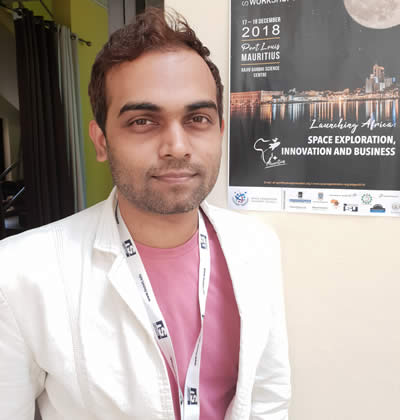 Law student and a public officer, Visham explained that his first degree was in Physics. “I have a science background and now alaw background. It is fascinating to learn about the law aspects related to the field of space. This workshop has allowed me to understand that as space science is an interdisciplinary sector, it includes many things, like you need lawyers, you need to know how to sell parts for the building of a space shuttle, among many others.” He added that the most important thing he learned is that space science is not only about money. “When India started its space programme with Nehru, they were poorer that most African countries are nowadays. So poverty was not a barrier.” Space science, he explained, is no longer just for rich countries but for every country and everyone. “For example, Mauritius is planning to use space technology to monitor fish patterns and illegal fishing because it is less costly that using radars in the sea. It is a market and we need to tap into its potential,” he uttered.
Law student and a public officer, Visham explained that his first degree was in Physics. “I have a science background and now alaw background. It is fascinating to learn about the law aspects related to the field of space. This workshop has allowed me to understand that as space science is an interdisciplinary sector, it includes many things, like you need lawyers, you need to know how to sell parts for the building of a space shuttle, among many others.” He added that the most important thing he learned is that space science is not only about money. “When India started its space programme with Nehru, they were poorer that most African countries are nowadays. So poverty was not a barrier.” Space science, he explained, is no longer just for rich countries but for every country and everyone. “For example, Mauritius is planning to use space technology to monitor fish patterns and illegal fishing because it is less costly that using radars in the sea. It is a market and we need to tap into its potential,” he uttered.
Visham trusts career guidance in Mauritius does not channel students towards the space science field. “This workshop has been an eye-opener because I myself never knew that there is an International Space University. There are huge career opportunities in this field. The Government is doing something in this direction, as we are among the few African countries which have the plan to launch a satellite, but it should definitely do more, especially in terms of career guidance and studies.”
Ani Vermeulen: “We want to have a voice in the future of space”
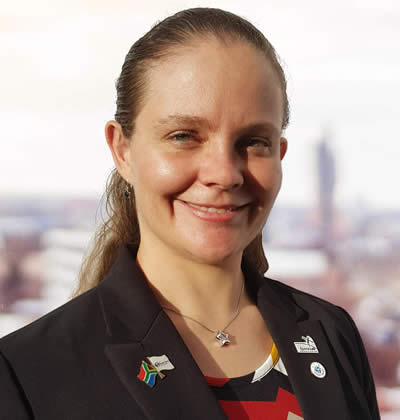 Master’s student in Space Studies from the University of Cape Town and member of the SGAC, Ani Vermeulen is one of the four scholarship winners for the African Space Leadership Award, which has allowed her to attend the two-day conference in Mauritius. As she sees it, the African Space Generation Workshop is an opportunity to do something that will have a higher impact than a global event. “It brings together a whole lot of young space students and professionals. We all have a passion for space regardless of professions.
Master’s student in Space Studies from the University of Cape Town and member of the SGAC, Ani Vermeulen is one of the four scholarship winners for the African Space Leadership Award, which has allowed her to attend the two-day conference in Mauritius. As she sees it, the African Space Generation Workshop is an opportunity to do something that will have a higher impact than a global event. “It brings together a whole lot of young space students and professionals. We all have a passion for space regardless of professions.
Also, we want to have a voice in the future of space not only in Africa but also globally and this is what SGAC gives us, a platform as future leaders of space industry. The young people who were here are the future leaders of space and for us to meet one another now, while we are young, it is an important networking opportunity and more importantly, as we’ve discussed challenges, ideas and concepts that are unique to our region, we’ve got an idea what are the resources and skills we have available and this will definitely help in the future when we have to set up a strategic partnership with someone in another country, we are already going to know who is on the other side.” Ani utters that Africa is falling behind when it comes to space science and actions needs to be taken now or we risk to be left behind. “We have to take proper advantage of our resources in Africa and there is incredible opportunity and potential in Africa...We need to convince the older generation of space professionals that our generation has plans and we need to start working on it now. I believe that this workshop can really have an impact on the future of space industry at a regional level in Africa.”
Speakers
James Barrington-Brown : “I really trust that Africa will be the next China in 20 or 30 years”
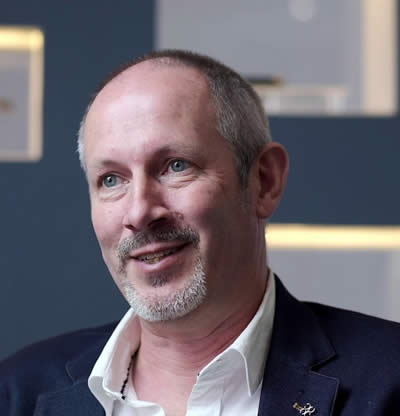 CEO of New Space-Systems, James Barrington-Brown says that Africans do have the skills, the capability and the finance to do things. “People are realising that actually, the youth here have got much skills and in some cases are more innovative. This conference really emphasised that all the participants are under 35-years-old. I am myself always enthused by young people, as they have innovative ideas.” In terms of workshop outcomes, James, who has been part of one of the group sessions on commercialisation, namely the setting up of start-ups in the space community, said that it is not easy but also not impossible for Africans to start their own companies and export into the international markets.
CEO of New Space-Systems, James Barrington-Brown says that Africans do have the skills, the capability and the finance to do things. “People are realising that actually, the youth here have got much skills and in some cases are more innovative. This conference really emphasised that all the participants are under 35-years-old. I am myself always enthused by young people, as they have innovative ideas.” In terms of workshop outcomes, James, who has been part of one of the group sessions on commercialisation, namely the setting up of start-ups in the space community, said that it is not easy but also not impossible for Africans to start their own companies and export into the international markets.
James Barrington-Brown underlined that Mauritius has been successful in having a partnership with Japan to launch the first satellite soon. “There are now around 80 countries around the world which have launched satellites and Mauritius will join them hopefully next year.” About the future of Africa in the space science field, James uttered that he trusts that Africa will be the next China. “We are starting on a blank piece of paper in Africa and they can take on the already developed technologies, accelerate quickly and produce things much more efficiently. Around 50% of the population of Africa is under 30. So with that enthusiasm, motivation and willingness, I really trust that Africa will be the next China in 20 or 30 years. It definitely has the potential as long as the country implements some things we have talked about here.”
Dr Tejumola Taiwo : “This conference is very positive for Mauritius”
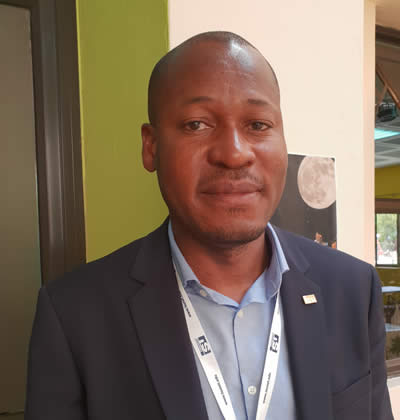 Professor at the International Space University in Strasbourg, France, and originally from Nigeria, Dr Tejumola Taiwo said that the conference has given the participants a great opportunity to interact with other young Africans and to learn how to further push the space science in the African agenda. “There have been very positive outcomes from this conference, especially by organising it in Mauritius where the space activities are just starting to kick off.
Professor at the International Space University in Strasbourg, France, and originally from Nigeria, Dr Tejumola Taiwo said that the conference has given the participants a great opportunity to interact with other young Africans and to learn how to further push the space science in the African agenda. “There have been very positive outcomes from this conference, especially by organising it in Mauritius where the space activities are just starting to kick off.
The Ministers, who were present for the launching on Monday, have seen what space science is about and I trust this is very positive to the development of the space technology for Mauritius. This type of conference broadens the knowledge of young Africans by making them learn about what space technology can do, what the technology has done and further push them to find ways to develop this technology.” Dr Tejumola Taiwo states that young Africans excel everywhere they go. “Of course, we do not have the technology, the infrastructure is often lacking but getting to know what we can achieve is a big step ahead... Because the participation from Africans in the space science field is low, we are thinking about how to increase it.”
The Minister of Technology, Yogida Sawmynaden, discussed ways “about organising the first programme for Africa in Mauritius.” Regarding the development of space science in Africa, he trusts that governments need to offer scholarships and do more when it comes to funding.
 J'aime
J'aime













